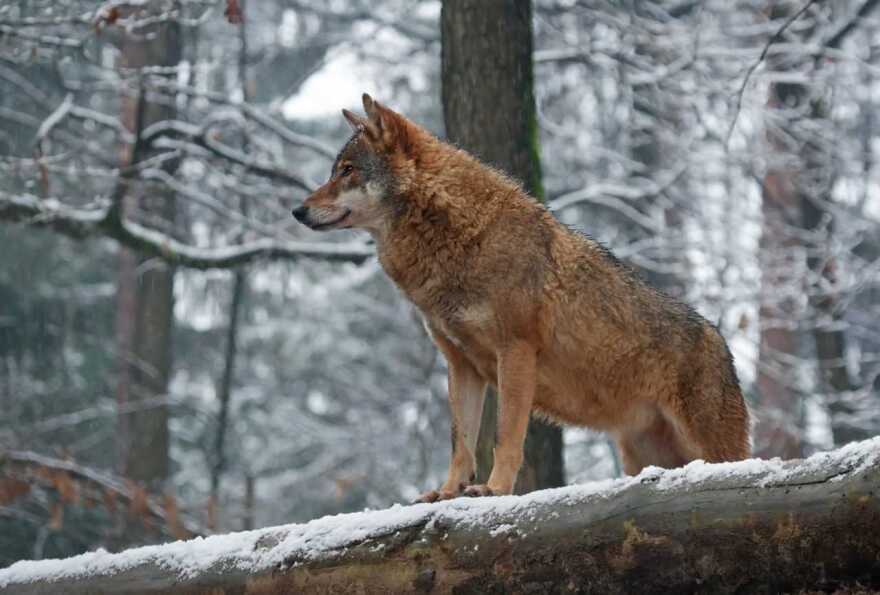A bill making its way through committee would end the Wisconsin DNR’s monitoring of wolves. The legislation would also prohibit law enforcement officers from taking action if a wolf is poached or harmed by things like traps.
At a heated public hearing Wednesday before the Assembly Committee on Natural Resources and Sporting Heritage, Senator Tom Tiffany (R) of Minocqua said the bill is designed to force Congress to remove wolves from the federal endangered species list.
President Barack Obama’s administration removed Great Lakes wolves from the endangered species list in 2012, on the heels of which Wisconsin held three wolf hunting seasons.
Then in 2014, a federal judge placed the wolf back on the endangered list.
Tiffany said that removing the animal from this list is “a bipartisan issue when you get to the northern half of Wisconsin. People want action on this and it’s not happened.”
Hunting group reaction to the bill was mixed.
Lucas Withrow of the Wisconsin Bearhunters Association expressed unreserved support. “It’s about the need and the want of our right in Wisconsin for wolves to be returned to us for management and until that happens, the federal government should continue to support, on their own, the population and all of its issues.”
Bill McCrary with Wisconsin Bowhunters said the association is a big supporter of wolf hunting and trapping, in order to manage its numbers and create a balanced wildlife ecosystem.
But he worried about the proposed bill’s unintended consequences. “Without continued state monitoring of the wolf population and wolf dynamics, we are concerned that Wisconsin will not have the current data and unquestionable scientific basis to manage wolves… once they are finally delisted.”
McCrary also fears the proposed legislation would lead to litigation. “If this issue remains in the courts those that support unlimited wolf protection will cite this legislation as evidence that Wisconsin may not be willing to manage wolves at a sustainable level.”
Rep. Amanda Stuck, a Democrat from Appleton, envisioned a free for all if the DNR steps out of the wolf management picture. “Did the DNR give feedback in terms of what this would mean?” she asked.
Rep. Rob Stafsholt (R) of New Richmond, who cosponsored the Assembly bill, responded with: “Adrian Wydeven, whom I’m sure will speak today, has been the wolf biologist for years and years, now retired, but he said to me a long time ago that we have met the population goal for delisting.” He added, “We’re using the science.”

Adrian Wydeven did speak, but not in support of the bill.
He served as state wolf biologist from 1990 to 2013 and now represents the Timberwolf Alliance, which promotes a healthy wolf population in suitable habitat.
Wydeven said the legislation would undermine state wolf delisting efforts “because it would fail to demonstrate that Wisconsin is prepared to assume stewardship of the wolf population.”
“Research done by the DNR shows that the citizens of Wisconsin support a sustainable population of wolves,” he added.
The biologist says wolf management requires weighing in lots of factors. “The Timberwolf Alliance believes it is important for the Wisconsin legislature to fulfill its responsibilities for managing wolves as a public trust resource by supporting wolf management practices that are scientifically sound, culturally sensitive and publicly supported.”
Adrian Treves, a professor of environmental studies at UW-Madison, thinks both state and federal governments lack some vital information when it comes to wolf management.
He co-authored a study, titled “Killing wolves to prevent predation on livestock may protect one farm but harm neighbors,” published Wednesday in the peer-reviewed journal PLOS One.
Treves’ team reviewed and evaluated 230 cases involving wolves attacking livestock in Michigan’s Upper Peninsula between 1998 and 2014.
He says the study revealed that euthanizing wolves that attack farm animals does not fix the problem. “No matter how many wolves are killed around a farm, there’s no reduction in future livestock losses that is statistically significant.”
"We need to evaluate policy interventions and management interventions as if they're experiments because we don't know they're going to work, or not work." - Adrian Treves
The researcher says while some farmers, whose livestock was killed by wolves, benefited, “that benefit was completely offset for higher loses for the livestock owners in neighboring townships… around the property where the wolves were killed.”
Treves says more research is necessary, and until a gold-standard experiment determines what methods are effective for protecting livestock, wolves and livestock will continue to die for no apparent purpose.
“The public should be asking itself, when the government steps in and does something, it should only do something effective, something that’s been proven effective, not something that a state legislature believes will work, not something that some livestock owners demand, but something that scientific evidence supports will be effective.”
Have an environmental question you'd like WUWM's Susan Bence to investigate? Submit below.
_







